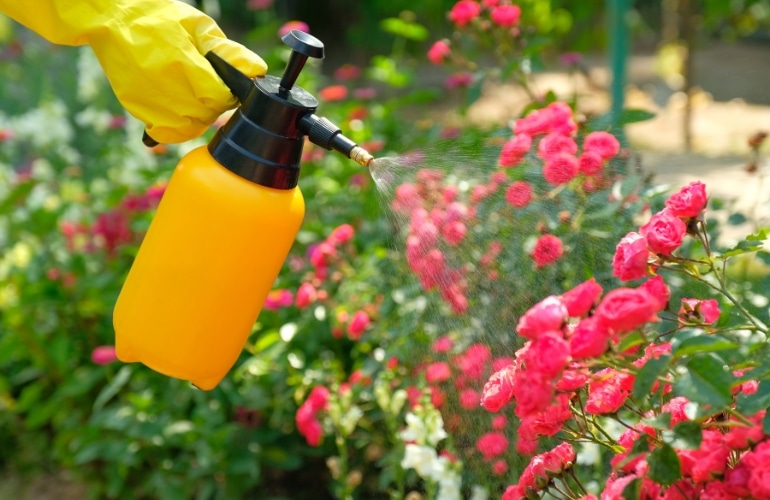Neem oil is a powerful organic solution for controlling diseases and pests in your garden. Derived from the seeds and leaves of the neem tree (Azadirachta indica), neem oil has gained popularity for its effectiveness in maintaining plant health without the use of synthetic pesticides.
Here’s a step-by-step guide on how to make your own neem oil spray for plants.
Recipe for Neem Oil Spray:
Ingredients:
- 5 ml (1 teaspoon) of neem oil
- 1 liter of warm water
- 1-2 ml (⅓ tsp) of mild liquid soap or another mild detergent
Instructions:
- Mix the soap and water in a bottle or container, and shake well to ensure the soap is completely dissolved.
- Add the neem oil to the mixture and shake again.
The most common concentration for regular and general garden use is 0.5-1%. You can experiment with higher doses, such as 2%, if your garden requires a stronger solution. Just be sure to add water if you increase the concentration.
When using neem oil spray, it’s essential to conduct a test on a limited area before applying it to your entire garden. Monitor the treated area for any adverse effects after 24 hours. If the plants respond well to the spray, it’s safe to use it on your garden.
Additional Tips for Using Neem Oil:
- Neem oil spray can be used once a week as a preventive measure against pests.
- Ensure that the leaves are fully coated in the spray to allow the active ingredients to have full contact with fungi, pests, and insects.
- Avoid spraying your plants in extreme temperatures, both cold and hot. Also, refrain from using neem oil spray in direct sunlight.
- Do not treat stressed plants until they are in better condition to avoid causing additional damage.
- Wash all produce from your garden before consumption, even though neem oil-based products are recognised as safe by the EPA.
Neem Oil’s Benefits for Your Garden:
- Acts as a bactericide, fungicide, and kills plant parasitic nematodes.
- Controls small soft-bodied insects such as aphids, spider mites, and whiteflies.
- Attacks the larvae of certain bugs and directly kills others.
- Works effectively against fungal diseases on plants, including powdery mildew, black spot, rust, and anthracnose.
- Compatible with beneficial nematodes, making it a preferred choice for organic growers.
What Pests Does Neem Oil Insecticide Kill?
Neem oil insecticide is celebrated for its efficacy in controlling a wide range of pests that can wreak havoc on plants. Its natural properties make it a preferred choice for organic gardeners seeking to manage pest infestations without resorting to synthetic chemicals. Here’s a look at the pests that neem oil insecticide can effectively target:
Insects:
- Aphids: Neem oil disrupts the hormonal balance of aphids, making it difficult for them to grow and reproduce.
- Whiteflies: The application of neem oil can help control whitefly populations by interfering with their feeding and reproductive capabilities.
- Japanese Beetles: Neem oil acts as a repellent and can hinder the growth and egg-laying process of Japanese beetles, reducing their impact on plants.
- Moth Larvae: Neem oil can effectively control moth larvae, disrupting their life cycle and preventing further damage to plants.
- Scale Insects: Neem oil can be used to combat scale insects by smothering the adult insects and inhibiting the development of eggs.
Fungal Diseases:
- Powdery Mildew: Neem oil is effective against powdery mildew on plants, preventing its spread and inhibiting the germination of new spores.
- Black Spot: Neem oil can help control black spot, a common fungal disease affecting roses and other ornamental plants.
- Rust: It can be utilised to manage rust, a fungal disease that causes yellow, orange, or reddish-brown powdery pustules on leaves and stems.
- Sooty Mold: Neem oil can aid in addressing sooty mold, a black fungus that grows on the honeydew excreted by certain insects.
Other Pests:
- Nematodes: Neem oil has been found to have nematicidal properties, making it effective in controlling plant parasitic nematodes.
- Various Larvae and Eggs: Neem oil, specifically the active chemical azadirachtin, targets insects at all stages of development, including eggs and larvae.
By targeting a broad spectrum of pests and diseases, neem oil serves as a versatile and sustainable option for maintaining the health and vitality of plants in an organic and environmentally conscious manner.
Neem oil serves as an effective insecticide and offers a myriad of benefits for maintaining a healthy garden ecosystem. With proper application and adherence to recommended concentrations, neem oil can be an invaluable tool for organic gardeners seeking to protect their plants while minimising their impact on the environment.
By following these guidelines, you can harness the power of neem oil to nurture a vibrant and thriving garden while promoting sustainability and environmental consciousness in your gardening practices.



